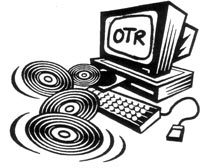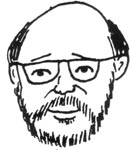|

This story was published in Radio Recall, the journal of the Metropolitan Washington Old-Time Radio Club, published six times per year.
Click here to return to the index of selected articles.
|
|
OLD TIME RADIO MEETS NEW TIME TECHNOLOGY
by Jim Widner, © 2005
(From Radio Recall, October 2005)
 Until recently, most fans of old time radio collected their favorite series on reel to reel or cassette. With the coming of the CD and DVD, some began to collect them using those media playing them as any CD or DVD would be played on most Players. Until recently, most fans of old time radio collected their favorite series on reel to reel or cassette. With the coming of the CD and DVD, some began to collect them using those media playing them as any CD or DVD would be played on most Players.
More recently, with the advent of the World Wide Web and the increasing number of users with Broadband access, a newer, compressed format called mp3 has found popularity among many - mostly newer collectors. However, since the sound quality was not noticeably diminished and the emphasis was increasingly on ease of listening, this has become a favored medium for even the longtime collectors.
Aficionados of the computer find it a boon to be able to collect complete runs of some of the series on a small number of CDs. In the days of reel to reel, it might have meant in order to have all of the available shows of Yours Truly, Johnny Dollar one would need about 69 reels. With mp3 it might mean about 8 CDs! And with the portability of the CDs, one could play them in the car, while out walking, or at home. The only downside was that generally, other than an automobile, one could only take a single disc at a time.
As the technology continues to change, newer methods of portability have become available. Now with portable mp3 players such as the memory based kind or the hard drive versions, such as the iPod, one can store many more of their favorite series as complete and carry them wherever they like and be plugged into old time radio everywhere. The hard drive based mp3 players contain more space yet retain their smallness compared to CD players. A 20 gigabyte iPod can hold up to much of a good sized collection of old time radio.
Old Radio versus Podcasting
Radio was once the dominant broadcast medium in the United States and around the world. Before television, radio offered drama, comedy, news, mystery, adventure and suspense that many now get from television. For many, sitting around the radio in the evening was a family affair.
While those days are gone, there have been attempts to bring back the old programs on radio with mixed success. Radio today controls what the listener will hear. If you like a particular program, you have to usually tune in when it is on. While it is possible to record it and listen later, for many that is not a good alternative. The same applies to radio stations that broadcast old time radio. One near me, for example, broadcasts an hour each weekday at the lunch hour. Generally, I am not out at lunch and so am not able to listen. If I were out, I would be forced to go at the time the radio program broadcasts. Satellite radio affords some degree of freedom as portable satellite receivers become as portable as mp3 players. But many current listeners of old time radio complain about the amount of commercial interruption in a medium that is generally considered free because of subscription. Again, radio drives the listener.
With the advent of portable mp3 players, a new method of access method is finding increasing popularity. It has been given the unfortunate name of podcasting taken mostly from the iPod popularity though it applies to any portable mp3 player. Podcasting allows you, using a free software, to capture mp3 files offered on the Internet to your computer and have the program automatically loaded onto your portable mp3 player using a method called Really Simple Syndication or RSS for short. Podcasting has brought to the fore many new and often innovative programs most of which have nothing to do with old time radio. Music programs, podcasts about life, collecting, and more are available created by amateurs and professionals, and some are even mp3 versions of popular radio programs from networks such as National Public Radio, the BBC, and other radio networks.
There are an increasing number of podcasters who are offering many old time radio programs and music from the past very similar to what one might hear on Yesterday USA, the satellite based nostalgia station run by Bill Bragg out of Texas.
So what is the advantage of all of this for old time radio fans? Using myself as an example, I subscribe (it is a free subscription) to many old time radio programs collected under one umbrella called the Radio Memories Network (disclaimer: I have a couple of programs on the network myself). Some of these programs include Western radio programs, suspense, science fiction, doo-wop music, Big Band music and more. I plug in my portable mp3 player into my computer at night and the next morning many new offerings from the Radio Memories Network are now loaded on my mp3 player for me to take to the office and listen while at work! Radio station WFMU out of New Jersey offers recordings on two shows from the Edison Archive in mp3 which also load onto my portable mp3 player.
What I like most about it is the variety of programming that allows me to simply listen perhaps in some way as one might have listened in the days when radio was king! Some of the programs also feature some historical perspective on an episode to which I might be listening . If I don’t want to hear it, I can fast forward past it. Unlike standard radio, I am in control.
The Web, my computer and OTR
One does not have to have a portable player to take advantage of either podcasting or any of the programs available via the web. The difference is that I could be tied more to my computer or within its vicinity if I don’t have the freedom of a portable player or a local re-transmitter.
It is possible to keep a complete library collection of old time radio and listen directly via the computer. There are also numerous webcasts of old time radio that offer streaming the content. This means you listen as it comes down to your computer from the web.
One of the most popular download and streaming sites is www.RadioLovers.com which offers many programs free of charge for you to download and listen.
The Radio Memories Network is found at radiomemories.libsyn.com. New programs of various genre are posted daily and now through agreement with Yesterday USA, many of its programs are also available.
Another option for webcast streaming include Live 365 and Shoutcast, free and subscription based webcasts by many different people. There are many old time radio programs available. These are not offered as podcasts which means you cannot move them to portable players. Like radio, the shows you hear are whatever they are streaming at the moment. Most of these are available twenty-four hours a day.
The Internet has made available many new options for fans of old time radio who are looking for more than simply collecting shows. Most likely we will never return to those “thrilling days of yesteryear” but we can certainly come close!

Jim Widner is a genial MWOTRC member in Dayton, OH. A diligent OTR researcher, Jim is the webmaster for “Radio Days” site at www.otr.com and the co-author of the 1996 book, Science Fiction on Radio. A former teacher, Jim now works in the computer industry. He contributes to RADIO RECALL occasionally and is a regular on the OTR Digest list-serve.
|